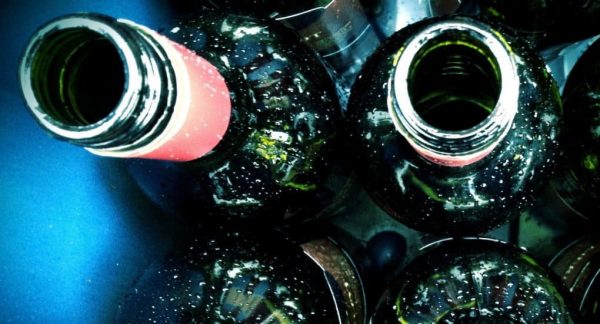
Alexander Tkachenko
Good people are saved. The bad ones, respectively, die. This understanding of salvation is not uncommon in today’s world. Everything here seems to be clear, logical and needs no explanation. But let’s try to figure it out: who is this good person exactly? By what signs can one determine that this person is good and worthy of salvation, and that one over there is a mediocre one and does not deserve salvation?
Here we immediately run into a number of problems. For example, let’s suppose a certain plumber Vasya regularly spends his salary on drinking and beats his wife. And his neighbor, a professor of mathematics, is a non-drinker, a conscientious worker and a wonderful family man. Which one is good and which one is bad? The answer, it would seem, is obvious: of course, the professor is good, and the plumber is a rare piece of rubbish. But there are the students, whom the professor ‘treats unfairly’ at every term for every little mistake, who are unlikely to agree with such an assessment of the teacher they dislike. And the plumber’s drinking buddies, on the contrary, are convinced that Vasya is a wonderful person, and his wife is a cobra that interferes with the cultural recreation of real men.

Photo: Iain Harper
The reason for such confusion, oddly enough, is the lack of objective criteria for the concept of a “good person”. The ideas of good and evil in the mass consciousness today, unfortunately, are very unsystematic, poorly understood and have no basis, except for personal preferences, common stereotypes and opinions that have developed due to the influence of the social environment, received upbringing and education. What one person considers decent for himself, another, perhaps, will evaluate as an improper and dishonest act. Therefore, the categories of “good-bad” in secular ethics today are more and more reminiscent of the wording of Leskov’s character: “What is good for a Russian equals death for a German.” One can, of course, try to derive clear ethical criteria from the opinion of the statistical majority. But the twentieth century has convincingly proved that even entire nations can make mistakes in dividing people into good and bad. And mistakes of this magnitude are always fraught with the barbed wire of a new Gulag, or the ovens of another Auschwitz.
But if we turn to Christian ethics, we see an even more mysterious picture. The thing is there is no concept of a “good person” at all in Christianity. In none of the twenty-seven books of the New Testament does this phrase occur even once. In Christianity, a person is not identified with his qualities and actions. In other words, a person who acts badly is not called bad in the Gospel. As well as doing good deeds is not defined as good. Moreover, Christians have a strict ban on definitions of this kind. The Lord says, “Judge not, and you will not be judged; do not condemn, and you will not be condemned; forgive, and you will be forgiven.” Therefore, it is obvious that the criteria for salvation should be sought where there is no division of people into good and bad.
Thieves, Publicans and Harlots
In the “Notebooks” by I. Ilf and E. Petrov there is a slogan remarkable in its absurdity, which they saw at a rescue station of one of the Odessa beaches. The slogan read: “The salvation of the drowning is the work of the drowning themselves.” The absurdity of such a method of rescue in the water is obvious. After all, a drowning person is someone who really needs salvation, who is dying and is no longer able to help himself. And if a person who is swimming has some problems in the water, but he is able to cope with them without outside help, then you can hardly call him a drowning person.
When we examine the Christian doctrine of Salvation, we find the same principle: only those who perish can be saved. Throughout the Gospel, Christ constantly communicates with people who can hardly be called good. Publicans, harlots, complete sinners came to Him in the hope of forgiveness of their sins. And none of them was condemned or rejected by Him. Moreover, the first person to enter the Kingdom of Heaven was … a criminal, a thief, crucified next to Christ on Golgotha. Here is how the Gospel tells about this: “And there were also two other, malefactors, led with him to be put to death. And when they were come to the place, which is called Calvary, there they crucified Him, and the malefactors, one on the right hand, and the other on the left. … And one of the malefactors which were hanged railed on him, saying, If thou be Christ, save thyself and us. But the other answering rebuked him, saying, Dost not thou fear God, seeing thou art in the same condemnation? And we indeed justly; for we receive the due reward of our deeds: but this man hath done nothing amiss. And he said unto Jesus, Lord, remember me when thou comest into thy kingdom. And Jesus said unto him, Verily I say unto thee, To day shalt thou be with me in paradise.” (Luke 23:32-33, 39-43)
But whom then does Christ condemn? Oddly enough, He condemns those, whom their contemporaries considered absolutely good people, and even righteous ones: the Pharisees, the scribes and the elders of the Jews. “…Verily I say unto you, That the publicans and the harlots go into the kingdom of God before you.” (Matthew 21:31) Today’s readers do need to be explained who the harlots are. And the publicans in the Gospel were called tax collectors recruited from the local population for the Roman treasury. Taking advantage of their privileged position, they shamelessly robbed fellow countrymen, charging them much more than they should. In general, they were someone in between the stealing tax inspectors and the policemen of the Great Patriotic War. And Christ valued such people higher than the experts and zealots of the Jewish Law!
And the reason for this assessment is very simple. All sinners who came to Christ to ask Him for the forgiveness of their sins were absolutely sure that they had no merit before God. They were outcasts. They were rejected by their people. They all knew that they deserved nothing but condemnation either from people or from God. Apart from the grace of God, they had nothing to rely on. And they received this grace. This, of course, does not mean that Christ saves only criminals and scoundrels. Just the one who is sinking to the bottom understands better that he is drowning. And sometimes it’s more convenient to push off from the bottom.
In one of the books of the Bible, amazing words describe God – “the Savior of the hopeless.” In this phrase, the very essence of Christianity is very accurately expressed. Whom does Christ save? Those who, finding themselves in a hopeless situation, ask Him for help, not hoping for anything else. These perishing people call themselves Christians. And dividing the dying into “bad” and “good” is not accepted even among rescuers from the Odessa beach. And if a good person, not being a Christian, hopes to be saved, there can be only two explanations for this. Either such person does not understand who Christians are, or he does not consider his situation completely hopeless. He can rely on his own strength or on the help of someone else besides Christ. And this is his legal right. God does not take away a person’s freedom of choice. But all good (as well as bad) people need to clearly understand the scale of the trouble, from which Christ saves those who agreed to call Him their Lord. Because Christ saves His people from death.
Freedom-loving Diver
No man knows his future. The world around us is constantly and rapidly changing. We are changing along with it. Each lived moment brings new circumstances into our lives, forcing us to adjust our plans even for the very near future. We can only guess with varying degrees of certainty what will happen to us and what we will try to avoid. And there is only one fact of our future biography each of us can be absolutely sure of. We will all die.
Each in his own time. Some will die from old age, others from illness or accidents… But we will definitely die. Man is afraid of death and does not like to think about it. But that doesn’t change things. In fact, we begin to die the moment we are born. And every second brings us closer to the end of our lives. This is where the question arises. If death is the complete cessation of the existence of the human personality, then it is completely incomprehensible: why was all this necessary? So, a person lived for some time, he rejoiced, he suffered… He tried to know the world, know himself in this world, he was looking for the meaning of his existence. And the meaning turned out to be that he himself, and his children and the children of their children, all without exception were sentenced to death. And the only thing left to do was to spend the remaining time of his life on getting the maximum amount of pleasure. Which, however, also quickly becomes boring. But it’s still better than nothing…
Christianity offers a completely different view of life and death. Man is born to live forever. Death for Christians is not the end, but simply a transition to another form of existence. And the quality of this existence directly depends on how a person lived his earthly life. In other words, we can use our life as a stepping stone to Eternal Life. But we can only understand how this happens by finding out what death is and where it came from.
Christian doctrine says that God did not create death. From a religious point of view, death is the result of the misused freedom that God granted to the first people. Man was created with a very high purpose – to be the vicar of God on earth. According to God’s plan, he was to reign over the entire material world, fulfilling God’s will for this world. But a person could also abandon this mission and begin to live according to his own will. Unfortunately, the first people chose the second variant of their relationship with God. But after all, a person does not have a source of life in himself, since God gave him this life. What happens to a living being that is cut off from the source of its life? There is a common allegorical plot on this topic in modern Orthodox opinion journalism.
For example, a diver is working deep underwater, on the seabed. The oxygen comes to him from the surface of the sea through a hose. And suddenly the diver decides that this hose restricts his freedom of movement. In order to calmly walk along the bottom in any direction for long distances, the diver cuts the hose… His further fate is obvious.
Having fallen away from God, man began to die. This mortality was inherited by all his descendants. The falling away from God as the source of life caused pathological changes in the spiritual and physical nature of man. It can be said that he contracted a fatal disease that is inherited and, despite all human efforts, is incurable.
But “The things which are impossible with men are possible with God” (Luke 18:27). The Creator of this world Himself came to people in order to heal the sick nature of man and restore the connection between man and God, which the first people had so imprudently destroyed. The falling away was due to the deviation of the human will towards evil. Therefore, in order to be saved, a person must bring his will into line with the Will of God, which is expressed in the commandments. It would seem, here is the answer to the question: you can just be a good person, keep the commandments and, thereby, be saved without being a Christian. And here we are faced with another paradox of Christianity. The fact is that the most important moment in the faith of Christians is their conviction of their complete inability to fulfill any of God’s commandments.
Profit Equals Benefit
In the Christian understanding, good is following God’s plan for the world and man, and evil is deviation from God’s will. Falling away from God has crippled the moral nature of man. All his spiritual qualities, originally intended for good, fell into disarray. The goodness of a fallen man turned out to be mixed with evil. Even knowing what is good, what is the Will of God, a person is not able to fulfill it with his most ardent desire. This is easy to verify for everyone. It is worth, for example, to try to stop dividing people into good and bad for at least one day (that is, to fulfill the commandment not to judge one’s neighbor). And it will immediately become clear that we are not capable of this. Our sick nature gets in the way of our good intentions. Here is how the Apostle Paul wrote about it: “For I know that in me (that is, in my flesh,) dwelleth no good thing: for to will is present with me; but how to perform that which is good I find not. For the good that I would I do not: but the evil which I would not, that I do.” (Romans 7:18) A driver who violated the rules of the road and got into an accident cannot drive on not because he forgot the rules, but because his arms are broken.
And if Christ gave people the commandments simply as a formal knowledge of the good, it would be incredibly cruel. The commandments would then be an insurmountable wall for a fallen man. But the Lord promised His help to anyone who dares to live according to His Commandments: “… and, lo, I am with you always, even unto the end of the world.” (Matthew 28:20) Christians call this God’s help in doing good – Grace. And they do not attribute any of the good deeds they have done to themselves. The source of all good for Christians is their God, who said: “Abide in me, and I in you. As the branch cannot bear fruit of itself, except it abide in the vine; no more can ye, except ye abide in me. I am the vine, ye are the branches: He that abideth in me, and I in him, the same bringeth forth much fruit: for without me ye can do nothing.” (John 15:4-5) A person is only required to show strong-willed determination to fulfill the Commandments. And God gives strength for this fulfillment. Such co-creation of man and God in the matter of salvation is called “synergy” in theology.

Giovanni Francesco Barbieri (Guercino). “Christ and the Woman of Samaria”
And the idea that Christians do good deeds in the hope of a reward can only come to someone who does not know the words of Christ: “… when ye shall have done all those things which are commanded you, say, We are unprofitable servants: we have done that which was our duty to do.” (Luke 17:10)
The Church is a hospital. The doctor in this hospital is Christ. And Christians are just sick people trying to follow the Physician’s orders exactly. Recovery, in a sense, can indeed be seen as a reward for the determination to go for a cure.
But salvation is the union of the human spirit with the Spirit of God. And if a person does good deeds without having this goal in mind, then it probably makes sense to remember that the word “profit” is used in Russian also in the meaning “benefit”. Doing selfless acts of goodness may turn out to be useless for a person if it does not lead him to the Source of all goodness.
The Most Terrible Disease
Tertullian wrote that the human soul is by its very nature Christian. After all, God created people in His own image. Therefore, the desire to do good is a natural property and need of any person, regardless of his religious beliefs. This is the same moral law in people that surprised Immanuel Kant so much. And there are a lot of people striving to follow this natural law of goodness. Despite the damage to the Image of God, a person carefully keeps the sparks of natural goodness in himself, intuitively understanding that this is his most valuable asset.
Thus, a traveler exhausted by long wanderings in the desert cherishes a flask with the last supply of water. This water is muddy and smells bad, but for a traveler it is more valuable than all the treasures in the world. And suddenly, behind another dune, a huge lake opens in front of him, filled with surprisingly clean and fresh water. And what should this traveler do? He can rush to the lake with the last of his strength, throwing everything that prevents him from running in order to quickly plunge into the saving cool waves. Or he can decide that he still has water left, and will go along the coast until his meager supply runs out. And then he would die of thirst, never touching the clear water that splashed at his very feet.
Christ said: “If any man thirst, let him come unto me, and drink.” (John 7:37) This is said about the thirst for goodness, about the striving for truth, as for the highest good. And to those who do good for the sake of good itself, the Lord necessarily reveals Himself. But whether a person accepts Christ as his Savior or considers it sufficient for himself to simply follow His Commandments, as another of the many ethical teachings, is a matter of personal choice for each person, whether he is good or bad. But when a person considers Christ to be God, and yet hopes to be saved by his own virtues, then he really runs the risk of being left out of salvation, even if he is a member of the Church. Because the most terrible disease of the human spirit is confidence in one’s own health.
Translated by pravmir.com
You can follow Pravmir.com on Twitter, Facebook*, Instagram, or Telegram.
*Currently we are experiencing some issue with adding posts on our official page on Facebook. Our IT specialists are working on solving this issue at the moment.

















